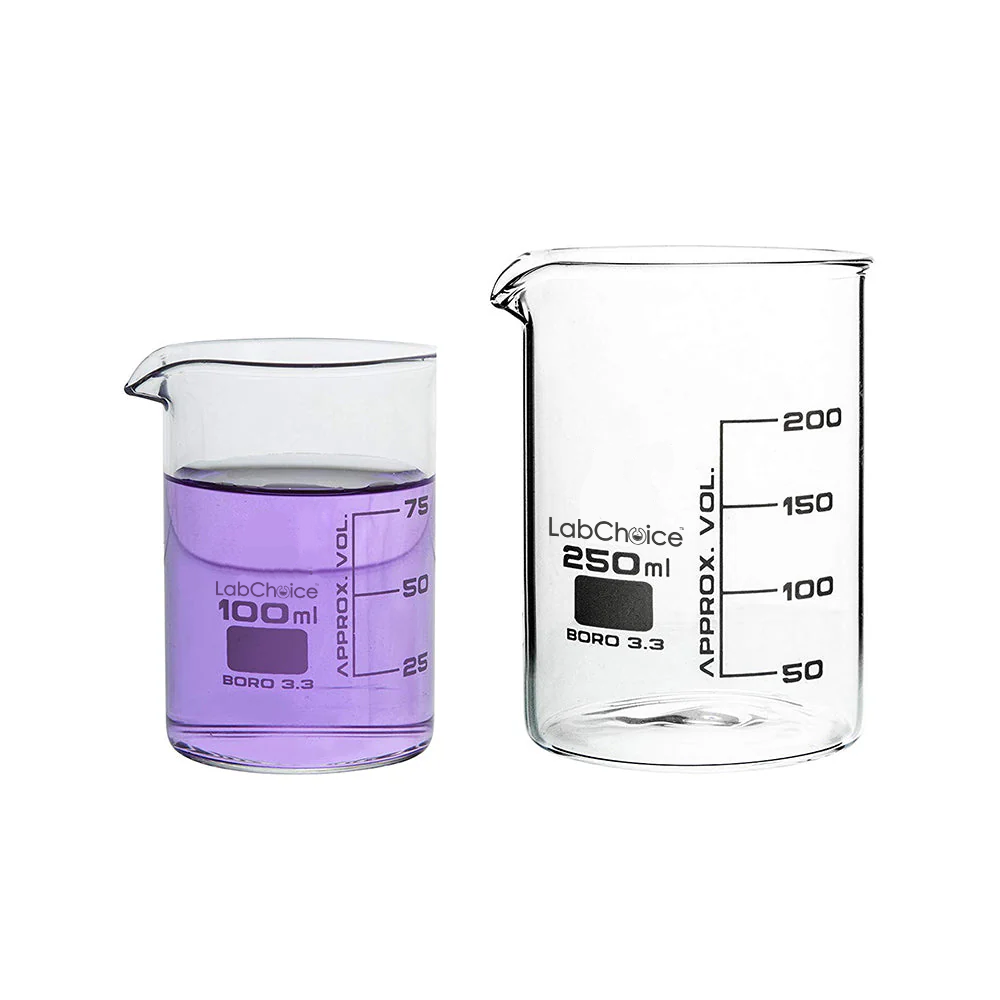6
Aug
How to Choose the Best Borosilicate Beaker Set for High-Heat Lab Use
Why Borosilicate Glass Is Ideal for High-Heat Lab Use
Borosilicate glass is composed of silica and boron trioxide, which significantly reduces its coefficient of thermal expansion. This allows the glass to remain stable when exposed to rapid temperature changes, open flames, or autoclaves. BORO 3.3-grade borosilicate is widely used in professional laboratories due to its safety and performance.
Key specifications:
- Coefficient of expansion: 3.3 × 10⁻⁶ /°C
- Thermal shock resistance: up to 165–180 °C
- Softening temperature: approximately 821 °C
- Chemical resistance: excellent for acids, bases, and solvents
- Flame compatibility: safe for use directly over Bunsen burners and hotplates
Soda-lime glass may resemble borosilicate but is not flame-safe and often cracks under sudden heat. Always verify the glass type before use.
What to Look for in a High-Quality Beaker Set
When selecting a borosilicate beaker set for heat-intensive work, consider the following key features:
1. Glass Grade: BORO 3.3
Ensure the set is clearly marked as BORO 3.3 or ISO 3585 compliant. This grade confirms high thermal and chemical resistance. Avoid generic “lab glass” claims without specification.
2. Wall Thickness
Look for heavy-wall construction, especially for beakers intended for boiling, flame use, or repeated sterilisation. Thicker glass resists cracking under heat stress and extends lifespan.
3. Etched Volume Markings
Graduations should be acid-etched and heat-proof, not printed. Etched markings remain visible and accurate after repeated heating and washing.
4. Size Range
An ideal beaker set includes multiple capacities, such as:
- 50 mL: for reagent heating
- 100–250 mL: for small-scale solution prep
- 500–1000 mL: for buffer prep or boiling reactions
The broader the size range, the more versatile the set.
5. Functional Design
Beakers should have a smooth pouring spout and a flat base. These features promote safe handling and even heat distribution on flame or hotplate surfaces.
Comparison: Borosilicate vs Soda-Lime Glass Beakers
| Feature | Borosilicate (BORO 3.3) | Soda-Lime Glass |
|---|---|---|
| Heat resistance | Up to 180 °C thermal shock | Prone to cracking above 80 °C |
| Flame compatibility | Safe for Bunsen burners | Unsafe for direct heat |
| Chemical resistance | Excellent | Moderate |
| Durability | High – reusable and flame-stable | Brittle – short lifespan |
| Suitable for high-heat use | Yes | No |
For any high-temperature procedure, soda-lime beakers are a safety hazard and should be avoided.
Common Applications for Borosilicate Beakers
Borosilicate beaker sets are essential in:
- Secondary school science experiments involving flame or heating
- Chemistry and biochemistry laboratories
- Buffer and reagent preparation in research environments
- Environmental and food testing labs
- Quality control and industrial R&D
They are used for boiling, titration, solution mixing, and general-purpose heating where accuracy and thermal stability are critical.
Why LabChoice Beaker Sets Are the Right Choice
At LabChoice Australia, our beakers are made from certified BORO 3.3 borosilicate glass and engineered for repeatable lab use. Each set includes:
- Thick-walled beakers from 50 mL to 1000 mL
- Acid-etched graduations for long-term clarity
- Precision pouring spouts and flat bases
- Safe for flame, autoclave, dishwasher, and sterilisation
- Locally stocked in Australia for fast delivery
Whether you’re equipping a school, upgrading research labs, or stocking an industrial facility, LabChoice beaker sets provide consistent, professional-grade performance.
Explore our full range of borosilicate glassware online.

Frequently Asked Questions
Can I use borosilicate beakers directly over a flame?
Yes. Beakers made from BORO 3.3 glass are flame-compatible. Use wire gauze or a tripod stand to support the vessel evenly over a Bunsen burner.
How do I confirm a beaker is borosilicate?
Look for markings on the beaker or packaging that state “BORO 3.3” or “ISO 3585.” LabChoice glassware includes these markings. Avoid glassware that does not list the material grade.
Are LabChoice beakers autoclavable?
Yes. LabChoice BORO 3.3 beakers are safe for use in autoclaves, hot air ovens, and laboratory dishwashers. They are also resistant to common sterilising chemicals.
